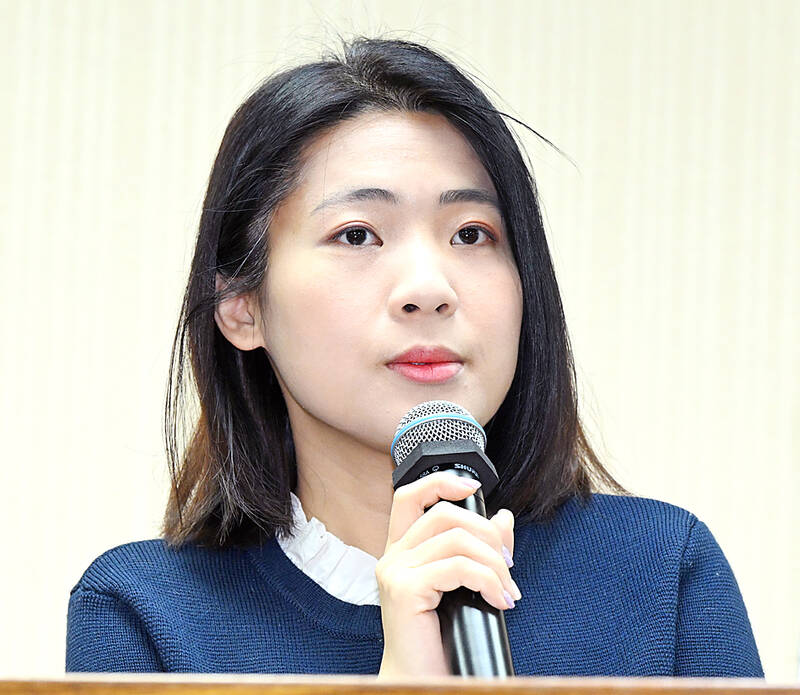The Ministry of Foreign Affairs rebutted allegations of dishonest handling of donations, after Chinese Nationalist Party (KMT) Legislator Hsu Chiao-hsin (徐巧芯) said on Thursday last week that the ministry had been dishonest about its cooperation with Lithuania and the Czech Republic in offering assistance to Ukraine.
The monetary donation made by Taiwan in these partnerships was allegedly handled by political sponsors or persons with special political influence in the partner countries, she said, questioning how much money was actually sent to help Ukraine.
The ministry said on Saturday that the accusations were “groundless, based on imagination and untrue,” adding that they discredited the efforts of ministry officials, harmed Taiwan’s like-minded partners in Europe and severely damaged the nation’s international image.

Photo: Liao Chen-huei, Taipei Times
The cooperative projects between Taiwan and its partners in providing humanitarian assistance to Ukraine have all gone through strict reviews and were “open and transparent,” the ministry added.
Hsu made additional statements against the ministry in a Facebook post yesterday, saying that it signed secretive agreements with a Czech medical device supplier under the pretense of aiding Ukraine.
Taiwan put US$10 million into a healthcare aid project with the Czech Republic to assist Ukraine, which would be carried out by the Czech Health Technology Institute, Hsu said.
Hsu asked about the fairness of the project, as it was signed a few months after institute chairman Petr Foit visited Taiwan in March last year, adding that her questions are all based on “concrete information.”
The Taipei Economic and Cultural Office in Prague and the Czech Economic and Cultural Office in Taipei signed a memorandum of understanding (MOU) in December last year to establish a three-year partnership to help rebuild Ukraine’s primary healthcare system, the ministry said yesterday.
The MOU also states that 30 to 40 percent of the donation made by Taiwan would be used to purchase medical supplies from Taiwanese manufacturers to promote commercial engagement between the two countries, the ministry said.
The Czech government designated the institute to carry out the project, which would be supervised by the two offices, it said.
After signing the MOU, the ministry submitted it to the Legislative Yuan according to the Conclusion of Treaties Act (條約締結法) and issued a press release announcing the project, the ministry said.

CHANGING LANDSCAPE: Many of the part-time programs for educators were no longer needed, as many teachers obtain a graduate degree before joining the workforce, experts said Taiwanese universities this year canceled 86 programs, Ministry of Education data showed, with educators attributing the closures to the nation’s low birthrate as well as shifting trends. Fifty-three of the shuttered programs were part-time postgraduate degree programs, about 62 percent of the total, the most in the past five years, the data showed. National Taiwan Normal University (NTNU) discontinued the most part-time master’s programs, at 16: chemistry, life science, earth science, physics, fine arts, music, special education, health promotion and health education, educational psychology and counseling, education, design, Chinese as a second language, library and information sciences, mechatronics engineering, history, physical education

The Chinese military has boosted its capability to fight at a high tempo using the element of surprise and new technology, the Ministry of National Defense said in the Quadrennial Defense Review (QDR) published on Monday last week. The ministry highlighted Chinese People’s Liberation Army (PLA) developments showing significant changes in Beijing’s strategy for war on Taiwan. The PLA has made significant headway in building capabilities for all-weather, multi-domain intelligence, surveillance, operational control and a joint air-sea blockade against Taiwan’s lines of communication, it said. The PLA has also improved its capabilities in direct amphibious assault operations aimed at seizing strategically important beaches,

‘MALIGN PURPOSE’: Governments around the world conduct espionage operations, but China’s is different, as its ultimate goal is annexation, a think tank head said Taiwan is facing a growing existential threat from its own people spying for China, experts said, as the government seeks to toughen measures to stop Beijing’s infiltration efforts and deter Taiwanese turncoats. While Beijing and Taipei have been spying on each other for years, experts said that espionage posed a bigger threat to Taiwan due to the risk of a Chinese attack. Taiwan’s intelligence agency said China used “diverse channels and tactics” to infiltrate the nation’s military, government agencies and pro-China organizations. The main targets were retired and active members of the military, persuaded by money, blackmail or pro-China ideology to steal

The High Prosecutors’ Office yesterday withdrew an appeal against the acquittal of a former bank manager 22 years after his death, marking Taiwan’s first instance of prosecutors rendering posthumous justice to a wrongfully convicted defendant. Chu Ching-en (諸慶恩) — formerly a manager at the Taipei branch of BNP Paribas — was in 1999 accused by Weng Mao-chung (翁茂鍾), then-president of Chia Her Industrial Co, of forging a request for a fixed deposit of US$10 million by I-Hwa Industrial Co, a subsidiary of Chia Her, which was used as collateral. Chu was ruled not guilty in the first trial, but was found guilty